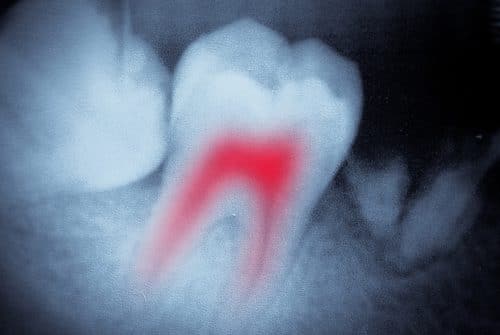
Root Canal in Cary, NC
There are few dental procedures that people are as afraid of as root canal therapy. While this may sound like a painful procedure, it really shouldn’t be. Instead, it’s a procedure that can actually help to alleviate severe pain that is being caused due to an infection of the root of a
tooth.
What Is Root Canal Therapy?
The pulp is located in the root of a tooth. This part of the tooth is made up of living connective tissue that can become infected when a cavity has caused severe enough damage, or when a tooth is cracked and exposed to bacteria. When the pulp of a tooth becomes infected, a procedure known as root canal therapy (or a “root canal”) is necessary to treat the infection, and halt the progress of further infection.
Contact Wake Dental Care Today
Signs that you need a Root Canal
As was stated above, root canal therapy actually alleviates the pain that is caused by an infected root. When the pulp of a tooth becomes infected, there are a variety of different symptoms. These symptoms will make it very clear that it is time for you to visit the dentist. Different symptoms of an infected pulp to look out for include:
- Severe pain or a massive toothache
- Swelling of the gums
- Pain when pressure is applied to the tooth
- Pain while biting or chewing
- Changes in the actual color of a tooth
- Sensitivity to hot or cold foods
If you experience these symptoms, set up an appointment with your dentist as soon as possible. Do not wait for the symptoms to become worse. Keep in mind that root canal therapy is necessary to save a tooth. If the infection and decay is allowed to persist, it can damage the tooth beyond repair. If this is the case, a tooth will need to be extracted. It’s important to overcome any fear or trepidation that you have about root canal therapy. Set an appointment as soon as you can to have your dentist take a look at your tooth.
Root Canal Process
The first step of root canal therapy is an inspection of the tooth by your dentist. You’ll need to set an appointment so your dentist can have a look, and diagnose the issue. There may only be a minor cavity that needs to be treated and filled. You also may be suffering from infected pulp, which will require root canal therapy.
Your dentist will numb your gums to ensure that you don’t feel pain during the procedure. Once your gums are numbed, your dentist will wrap a rubber piece around the tooth to ensure saliva doesn’t get in the way. A special drill will be used to open the tooth, allowing your dentist to work
on the pulp of your tooth. Your dentist will then clear away any bacteria and decay. Once the root is perfectly clean, they will restore the tooth with a filling.
Often times root canal therapy can be completed in one visit. It may take multiple visits, though, if additional treatment is required.
Dentists You Can Trust
We take the time to explain treatment and use the latest in dental technology to ensure a conservative approach to your dental care. We have specialized eyepieces and special decay-detecting dye to be sure we can see the smallest amount of decay and remove only the diseased portions of the tooth. Our iTero scanner allows us to scan your teeth and create restorations with world-class accuracy.

Dr. Jim Bohn
Dr. Bohn is a native of Pennsylvania. He earned a Bachelor’s of Science in Biology at Penn State University and a Doctorate of Medical Dentistry from Temple University School of Dentistry.

Dr. Jerry Allen
Dr. Jerry Allen was born and raised in Eastern North Carolina. He received his Doctorate of Dental Surgery (D.D.S) with Honors from the University of North Carolina at Chapel Hill.
Avoiding Root Canals
Even though root canal therapy is not as bad as you may have made it out to be in your head, it still is a procedure that you’ll want to avoid. In order to do this, you’ll want to visit your dentist every six months for a checkup and cleaning. From there, they can check to see if you have any cavities. If you do, they can clean the decay, and fill the tooth with a filling.
Avoiding a root canal also requires you to take proper care of your oral health. This means brushing, flossing and rinsing out your mouth at least twice a day, every day. If you have any questions about how to properly brush, floss or rinse, speak with your dentist or dental hygienist during your next checkup. They will be happy to walk you through how to properly care for your teeth, gums, tongue and cheeks.
Pulpotomy
Just like adults, children can get cavities. Actually, it’s much easier for a child to get a cavity—which is why they are very common among children. If your child gets a cavity that continues to get worse until the point of an infection in the pulp of their tooth, they will need what is called a “pulpotomy.” This term simply refers to a procedure that is similar to root canal therapy that is performed on a child’s baby tooth. If you have any additional questions about pulpotomies, speak with your family dentist or pediatrician.
In order to avoid a pulpotomy, make sure to take your child to the dentist regularly—at least twice a year. Also stay on top of your child’s brushing, flossing and rinsing routine. Make sure they are taking care of their mouth twice a day. Also make sure that they know how to properly brush, floss and rinse.
Root Canal Cost
The cost of root canal therapy depends on a variety of factors. These will often include which tooth requires the root canal (some have multiple roots), the dentist you select, the area that you live in and the amount of restoration that is required for the tooth after the procedure. Dental insurance will likely cover at least part of the procedure since it is a very common procedure, but it is still important to speak with your insurance company about coverage.
If you have dental insurance, you may also want to look for a dentist that will work with your dental insurance-network. Root canal therapy can be quite costly when trying to pay for it out- of-pocket.
If you are experiencing any pain or pressure in a tooth, make sure to set an appointment with your dentist immediately. Do not wait until your next checkup. If you are proactive, you may be able to avoid root canal therapy or—even worse—a tooth extraction.
Speak with your dentist if you have any additional questions about root canal therapy, and how you can avoid root canal therapy in the future.

